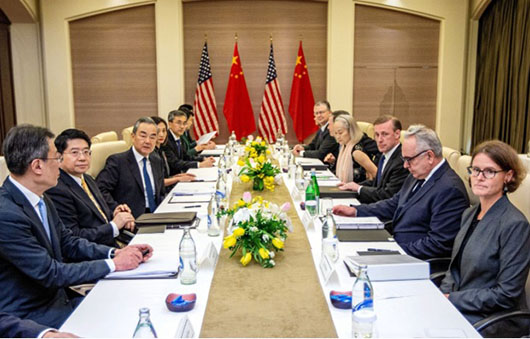FPI / January 31, 2024
By Richard Fisher
On Jan. 26 to 27 Biden Administration National Security Advisor Jake Sullivan and Asia Policy Coordinator (and Deputy Secretary of State nominee) Kurt Campbell met with Chinese Foreign Minister Wang Yi in Bangkok, Thailand.

The meeting had the effect of reinforcing the Chinese Communist Party’s (CCP) longstanding practice of using proxies to attack the democracies.
China is using its ancient stratagem of the “Borrowed Knife,” when it builds up others such as proxy states like Iran and North Korea, to attack its enemies the powerful democracies of the United States and Israel, while allowing China to evade responsibility.
The Biden Administration empowered this stratagem when it decided to treat China as a normal country that should be opposed to the barbarous Hamas War against Israel that started on Oct. 7, 2023. It then asked for the CCP’s help in Bangkok to end not only that conflict but also the missile and drone campaign against Western shipping conducted by Yemen’s Islamic radical Houthi forces.
Specifically, the Biden Administration asked the Chinese to use their influence with Iran to convince it to help end the Hamas and Houthi wars.
In a Jan. 23 press conference, White House National Security Council spokesman John Kirby advanced the idea that China has influence, saying:
“China has influence over Tehran; they have influence in Iran. And they have the ability to have conversations with Iranian leaders that — that we can’t…What we’ve said repeatedly is: We would welcome a constructive role by China, using the influence and the access that we know they have, to try to help stem the flow of weapons and munitions to the Houthis.”
The Bangkok meeting was the third of the Sullivan-Wang “back channel” non-public spectacle meetings that the United States hopes would give it the chance to explain its objections to threats that China is creating.
But the disconnect begins in that Washington should not be asking Beijing for its help to convince Iran to end the Iranian directed and funded wars against Israel.
The U.S. should have been demanding for years that China cease its overall economic-military support for Iran that has enabled the wars of its proxies Hamas, the Houthis and Hizbullah.
Iranian weapons, China-assisted Iranian weapons and Chinese weapons have been captured from Hamas by Israel, and Iranian and China-assisted Iranian weapons on their way to the Houthis have been captured by the United States Navy.
Full Report . . . . Current Edition . . . . Subscription Information
Free Press International
